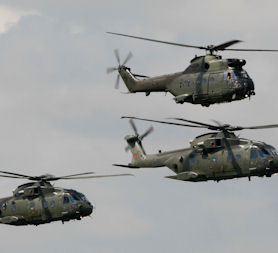RAF chief: cuts will have impact on manpower
The head of the Royal Air Force, Air Chief Marshal Sir Stephen Dalton, tells Channel 4 News cuts will mean fewer people in the RAF – but stresses it will remain one of the UK’s fighting forces.

On the 70th anniversary of the Battle of Britain, Sir Stephen told Channel 4 News that he expected there to be an “impact on manpower” in the RAF as a result of government cuts.
The coalition government is seeking billions of savings across the public sector to cut the deficit, and defence is no exception.
The findings of the strategic defence review into how best to use funding across the armed forces will be published later this year. It has taken into account the needs of modern warfare in places like Iraq and Afghanistan.
There has been speculation that the RAF could be subsumed into the other armed forces to cut costs.
We will be here in 2018 to celebrate our centenary, I promise you that.
However Sir Stephen said he expected the RAF would still be around to celebrate its centenary in 2018.
“All the options that are open mean that there will some impact on manpower,” he said. “There is no doubt there will be less people in the air force in two, three, four or five years’ time than we have now. That is a factor of the country trying to come to terms with how we afford defence in future.”
He said it was not yet clear how much smaller the air force would be, or where the job losses would come from, but said: “All the services are going to have to look very hard at their manpower bill. That is an expensive element of defence.”
However he defended the armed forces’ procurement processes, saying: “97 per cent of projects we do come in on time, and to performance, and to cost…of course it is the big projects which get the headlines. There is a lot we can do to make the management better.”
He said the “cost benefit” of aircraft carriers – two of which could be scrapped in the cuts – had to be worked out to see if the country could afford them.
He said renewing the nuclear deterrent Trident was “very much a policy question” and was there to ensure the UK had the “ultimate deterrent, if that’s necessary.”
Long term aim for armed forces
He said the aim was to make sure that the armed forces in future were “much better honed, much better prepared, and much better connected”.
He said that fighting in Afghanistan in the skies would prevent another Battle of Britain over London.
“The point must be to take the battle to the enemy so he never gets to the people,” he said.
His comments came as he unveiled a statue to the RAF leader who won the Battle of Britain in 1940, Sir Keith Park.
He told Channel 4 News: “Although we may have fewer airplanes than, say, Sir Keith Park had, they will be much more effective in what they can do.”
When asked if there was any risk of the RAF being consigned to history, he said: “It will continue to be the Royal Air Force and we will be here in 2018 to celebrate our centenary, I promise you that.”




